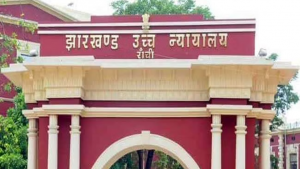 The Hon’ble High Court of Jharkhand vide its order dated 5.10.2023 in the matter of Satyendra Singh Kushwah Versus The State Of Jharkhand & Others Cr.M.P. No. 2454 of 2019 Cr.M.P. No. 2449 of 2019, considering the fact that summons under Section 70 were duly replied and were entertained by the authority concerned, and no case under Section 125 and Section 132 of the CGST Act has been initiated against the accused, quashed the entire criminal proceedings finding that allowing to continue the proceeding under Section 174 of the Indian Penal Code against the accused will amount to abuse of process of law.
The Hon’ble High Court of Jharkhand vide its order dated 5.10.2023 in the matter of Satyendra Singh Kushwah Versus The State Of Jharkhand & Others Cr.M.P. No. 2454 of 2019 Cr.M.P. No. 2449 of 2019, considering the fact that summons under Section 70 were duly replied and were entertained by the authority concerned, and no case under Section 125 and Section 132 of the CGST Act has been initiated against the accused, quashed the entire criminal proceedings finding that allowing to continue the proceeding under Section 174 of the Indian Penal Code against the accused will amount to abuse of process of law.
The Petitioners i.e., the Director and the said company, filed the writ petitions before the Hon’ble Court seeking quashing of the entire criminal proceedings arising out of Complaint Case No.1880 of 2019, dated 15.04.2019 including the order taking cognizance dated 19.06.2019, whereby, the learned Court has been pleased to take cognizance under Section 174 of the Indian Penal Code, pending in the court of the learned Judicial Magistrate, 1st Class, Ranchi.
Facts of the Case: –
- The complaint case was filed alleging therein that the accused had taken G.S.T. Registration on 14.12.2017 and has been providing various Taxable Services to various Service recipients since December, 2017, but has not made payment of GST from January, 2018 to November, 2018 before initiation of the investigation.
- It was further alleged that the accused deliberately ignored the summons issued by the Central Goods and Service Tax Department under Section 70 of the CGST Act, 2017 and also did not appear at any date against four summons issued to the Accused. It was also alleged that the accused has violated the provisions of Section 70 of the CGST Act, proceeding under Section 174 of the Indian Penal Code is initiated against the accused person.
Petitioner’s Submissions: –
- It was argued on the behalf of the petitioners that pursuant to the complaint case, the learned court has been pleased to take cognizance vide order dated 19.06.2019 under Section 174 of the Indian Penal Code against the said company and its Director. Further, the details of the summons issued, as alleged, are not mentioned in the complaint petition.
- That from the introduction of GST regime, the petitioner-company is engaged in providing services for transportation of coal and obtained registration in respect of its business carried out in the State of Jharkhand.
- The Petitioner-company raised bills for payment to its clients and the said clients being service recipients were delaying in releasing payment. However, GST amount to the tune of Rs.5,60,52,391/- has been paid in three installments.
- Further, it was submitted that GST is a complete Code in itself and there are provisions of penalty and in view of that, Section 174 of the Indian Penal Code is not attracted. Referring to Section 70, it was submitted that power to summon persons to give evidence and produce documents is prescribed under Section 70 of the said Act.
- Further, referring to Summons dated 29.12.2018, it was submitted that was paid on 05.12.2018 and by the said letter, further 45 days’ time was requested for further depositing the GST amount. It was submitted that total sum of Rs.1.5 Crore was paid on 14.01.2019 and 16.01.2019 and finally total amount of Rs.5,60,52,391/- was paid on 08.02.2019.
- It was submitted that as the summons were replied, there was no occasion on the authority concerned to file complaint case under Section 174 of the Indian Penal Code.
- There was no allegation with regard to the involvement of Satyendra Singh Kushwah, who is the director the Petitioner-company. Further, the statute is not providing any vicarious liability that cannot be imposed.
- The deposit of GST amount has been accepted by the authority. Therefore, it was argued that the cognizance under Section 174 of the Indian Penal Code is bad in law.
Respondents’ Submissions: –
- It was argued on behalf of the respondents that the petitioner has failed to comply with summons without lawful excuse and intentionally omit to give evidence or to make statement and to produce the documents and the things mentioned in the schedule.
- The Authorized representative of the company has not appeared, leading to filing of complaint under Section 174 of the Indian Penal Code, which is meant for non-compliance of the direction of the public authority and GST authority is the public authority in view of Section 156 of the CGST Act, 2017.
- The petitioner-company is a private limited company and in view of that, Section 89 of the CGST Act is applicable and there is no requirement of giving such statement and in view of that provision, every person who was looking day-to- day affairs of the company is liable.
- Referring to Section 135 of the CGST Act, it was submitted that presumption of culpable mental state can be proved only in trial, and once summon is issued and the petitioner has not appeared, in view of that Section 174 of the Indian Penal Code is well maintainable. Therefore, the writ petition is liable to be dismissed.
Held: –
- The Hon’ble Court after considering the submissions made and facts of the case, took note of the material on record including the summons issued to the Company in M.P. No. 2449 of 2019, and found that the summon dated 27.12.2018 was addressed to M/s SSK Devcon Private Limited and pursuant to that, the company vide letter dated 29.12.2018 replied the said summon informing the authority concerned that sum of Rs.1,56,20,520/- was deposited on 05.12.2018 and 45 days’ further time was requested for depositing further dues. The Authority vide its letter dated 14.01.2019 allowed time and directed to make the full payment of GST amount.
- It was found that in total sum of Rs. 5,60,52,391/- inclusive of the earlier payments have been made to the authority concerned. Thus, it is crystal clear that so far as the amount of GST is concerned, that has already been deposited, which has been admitted by the respondents in the counter-affidavit, though, same is subject to verification. However, non-filing of any case or initiation of proceeding for any recovery suggest that there is no due against the petitioners.
- It was further found by the Hon’ble Court that there is no further proceeding against the petitioner for determination of any tax not paid and that provision is there in Section 73 of the CGST Act, 2017. Thus, it is an admitted fact that the amount in question has already been paid.
- It was found that Section 70 of the CGST Act, 2017 speaks of power to summon persons to give evidence and produce documents and inquiry under the same will proceed under the provision of the Civil Procedure Code and only Sections 193 and 228 of the Indian Penal Code is applicable in view of Subsection (2) of Section 70 of the said Act.
- Further, it is an admitted case that no case under Sections 125 and 132 of the said Act is initiated against the petitioners. The documents on record clearly suggest that summons have been replied, which was also entertained by the authority by way of granting time. Thus, it cannot be said that this is a case of non-compliance of summon issued by the authority concerned.
- The Hon’ble Court considering the fact that the summons were replied, and entertained by the authority concerned, it cannot be said that the petitioners have not complied with the summons. Further, no penalty under Section 125 (General Penalty) and Section 132 (Punishment for certain offences) of the said Act, is the subject matter of the present cases.
- It was found that Section 70 of the Act speaks of procedure to be adopted for summoning, that will in accordance with the Code of Civil Procedure and considering the fact that the reply to the summons were entertained by the authority concerned, to allow to continue the proceeding under Section 174 of the Indian Penal Code against the petitioners will amount to abuse of process of law.
- The Hon’ble Court in view of the aforesaid facts, reasons and analysis, quashed the entire criminal proceedings arising out of Complaint Case No.1880 of 2019, dated 15.04.2019 including the order taking cognizance dated 19.06.2019, pending in the Court of the learned Judicial Magistrate, 1st Class, Ranchi.
The Hon’ble Court with the above findings and observations, allowed the writ petitions.
To read the complete judgment 2023 Taxo.online 1041



